大学英语精读第一册 Exercise of Unit Two
- 格式:ppt
- 大小:768.50 KB
- 文档页数:34
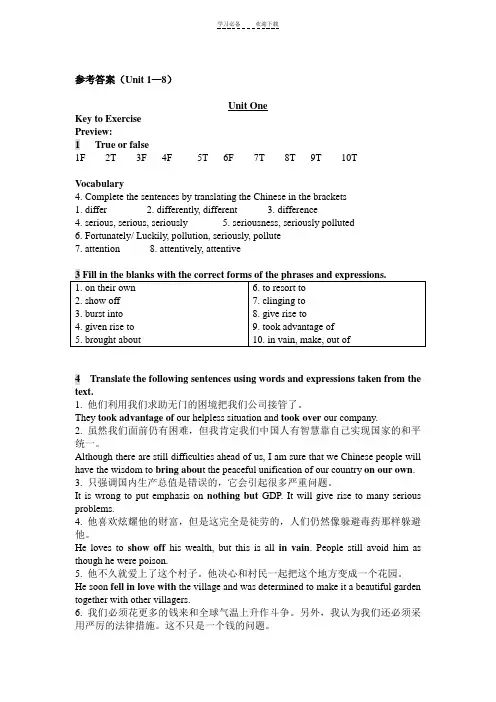
参考答案(Unit 1—8)Unit OneKey to ExercisePreview:1 True or false1F 2T 3F 4F 5T 6F 7T 8T 9T 10TVocabulary4. Complete the sentences by translating the Chinese in the brackets1. differ2. differently, different3. difference4. serious, serious, seriously5. seriousness, seriously polluted6. Fortunately/ Luckily, pollution, seriously, pollute7. attention 8. attentively, attentive4 Translate the following sentences using words and expressions taken from the text.1. 他们利用我们求助无门的困境把我们公司接管了。
They took advantage of our helpless situation and took over our company.2. 虽然我们面前仍有困难,但我肯定我们中国人有智慧靠自己实现国家的和平统一。
Although there are still difficulties ahead of us, I am sure that we Chinese people will have the wisdom to bring abou t the peaceful unification of our country on our own.3. 只强调国内生产总值是错误的,它会引起很多严重问题。
It is wrong to put emphasis on nothing but GDP. It will give rise to many serious problems.4. 他喜欢炫耀他的财富,但是这完全是徒劳的,人们仍然像躲避毒药那样躲避他。
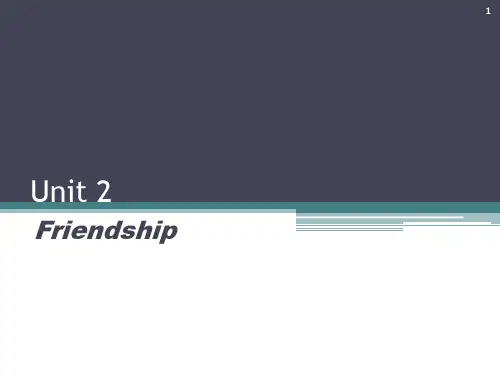
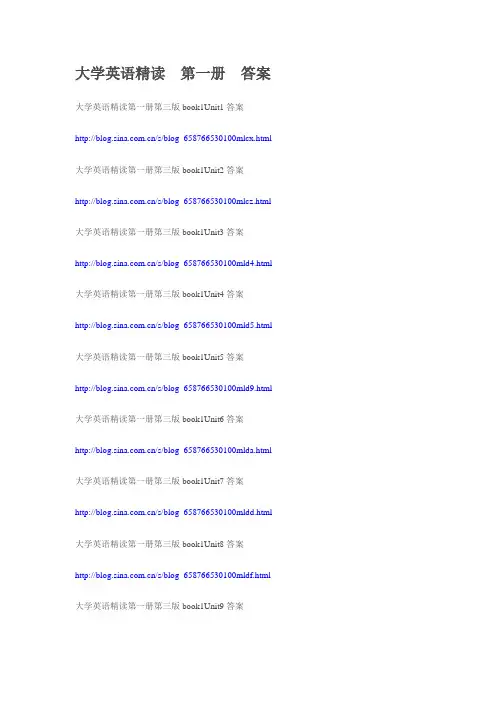
大学英语精读第一册答案大学英语精读第一册第三版book1Unit1答案/s/blog_658766530100mlcx.html 大学英语精读第一册第三版book1Unit2答案/s/blog_658766530100mlcz.html 大学英语精读第一册第三版book1Unit3答案/s/blog_658766530100mld4.html 大学英语精读第一册第三版book1Unit4答案/s/blog_658766530100mld5.html 大学英语精读第一册第三版book1Unit5答案/s/blog_658766530100mld9.html 大学英语精读第一册第三版book1Unit6答案/s/blog_658766530100mlda.html 大学英语精读第一册第三版book1Unit7答案/s/blog_658766530100mldd.html 大学英语精读第一册第三版book1Unit8答案/s/blog_658766530100mldf.html 大学英语精读第一册第三版book1Unit9答案/s/blog_658766530100mldk.html大学英语精读第一册第三版book1Unit10答案/s/blog_658766530100mldl.html大学英语精读第一册第三版课后翻译答案/s/blog_658766530100mldm.html欢迎点击/enfreshman查看更多大学英语精读答案大学英语精读第二册答案大学英语精读第二册第三版book2Unit1答案/s/blog_658766530100iulr.html大学英语精读第二册第三版book2Unit2答案/s/blog_658766530100iult.html大学英语精读第二册第三版book2Unit3答案/s/blog_658766530100izab.html大学英语精读第二册第三版book2Unit4答案/s/blog_658766530100j1dv.html大学英语精读第二册第三版book2Unit5答案/s/blog_658766530100j1dw.html/s/blog_658766530100j1dx.html大学英语精读第二册第三版book2Unit7答案/s/blog_658766530100j1e0.html大学英语精读第二册第三版book2Unit8答案/s/blog_658766530100j1e3.html大学英语精读第二册第三版book2Unit9答案/s/blog_658766530100j9eg.html大学英语精读第二册第三版book2Unit10答案/s/blog_658766530100j9ej.html大学英语精读第二册第三版课后翻译答案/s/blog_658766530100lctj.html欢迎点击/enfreshman查看更多大学英语精读答案大学英语精读第三册答案大学英语精读第三册第三版book3Unit1答案/s/blog_658766530100mldq.html大学英语精读第三册第三版book3Unit2答案/s/blog_658766530100mldt.html/s/blog_658766530100mldu.html大学英语精读第三册第三版book3Unit4答案/s/blog_658766530100mldv.html大学英语精读第三册第三版book3Unit5答案/s/blog_658766530100mldx.html大学英语精读第三册第三版book3Unit6答案/s/blog_658766530100mle1.html大学英语精读第三册第三版book3Unit7答案/s/blog_658766530100mle2.html大学英语精读第三册第三版book3Unit8答案/s/blog_658766530100mle6.html大学英语精读第三册第三版book3Unit9答案/s/blog_658766530100mle8.html大学英语精读第三册第三版book3Unit10答案/s/blog_658766530100mlea.html大学英语精读第三册第三版课后翻译答案/s/blog_658766530100mleb.html欢迎点击/enfreshman查看更多大学英语精读答案大学英语精读第四册答案大学英语精读第四册第三版book4Unit1答案/s/blog_658766530100lc8s.html 大学英语精读第四册第三版book4Unit2答案/s/blog_658766530100lc8o.html 大学英语精读第四册第三版book4Unit3答案/s/blog_658766530100lc8n.html 大学英语精读第四册第三版book4Unit4答案/s/blog_658766530100lc8m.html 大学英语精读第四册第三版book4Unit5答案/s/blog_658766530100lc8k.html 大学英语精读第四册第三版book4Unit6答案/s/blog_658766530100lbe3.html 大学英语精读第四册第三版book4Unit7答案/s/blog_658766530100lbe0.html 大学英语精读第四册第三版book4Unit8答案/s/blog_658766530100lbdz.html 大学英语精读第四册第三版book4Unit9答案/s/blog_658766530100lbay.html大学英语精读第四册第三版book4Unit10答案/s/blog_658766530100lb6f.html大学英语精读第四册第三版课后翻译答案/s/blog_658766530100lc8u.html欢迎您点击/enfreshman查看更多大学英语精读答案。
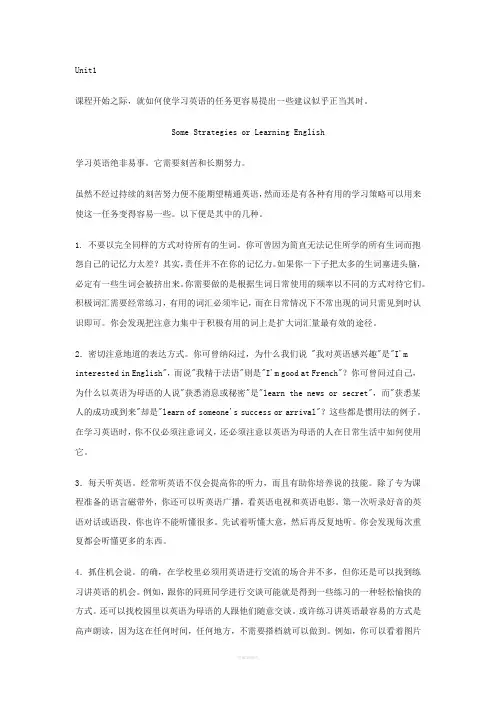
Unit1课程开始之际,就如何使学习英语的任务更容易提出一些建议似乎正当其时。
Some Strategies or Learning English学习英语绝非易事。
它需要刻苦和长期努力。
虽然不经过持续的刻苦努力便不能期望精通英语,然而还是有各种有用的学习策略可以用来使这一任务变得容易一些。
以下便是其中的几种。
1. 不要以完全同样的方式对待所有的生词。
你可曾因为简直无法记住所学的所有生词而抱怨自己的记忆力太差?其实,责任并不在你的记忆力。
如果你一下子把太多的生词塞进头脑,必定有一些生词会被挤出来。
你需要做的是根据生词日常使用的频率以不同的方式对待它们。
积极词汇需要经常练习,有用的词汇必须牢记,而在日常情况下不常出现的词只需见到时认识即可。
你会发现把注意力集中于积极有用的词上是扩大词汇量最有效的途径。
2.密切注意地道的表达方式。
你可曾纳闷过,为什么我们说 "我对英语感兴趣"是"I'm interested in English",而说"我精于法语"则是"I'm good at French"?你可曾问过自己,为什么以英语为母语的人说"获悉消息或秘密"是"learn the news or secret",而"获悉某人的成功或到来"却是"learn of someone's success or arrival"?这些都是惯用法的例子。
在学习英语时,你不仅必须注意词义,还必须注意以英语为母语的人在日常生活中如何使用它。
3.每天听英语。
经常听英语不仅会提高你的听力,而且有助你培养说的技能。
除了专为课程准备的语言磁带外,你还可以听英语广播,看英语电视和英语电影。
第一次听录好音的英语对话或语段,你也许不能听懂很多。
先试着听懂大意,然后再反复地听。
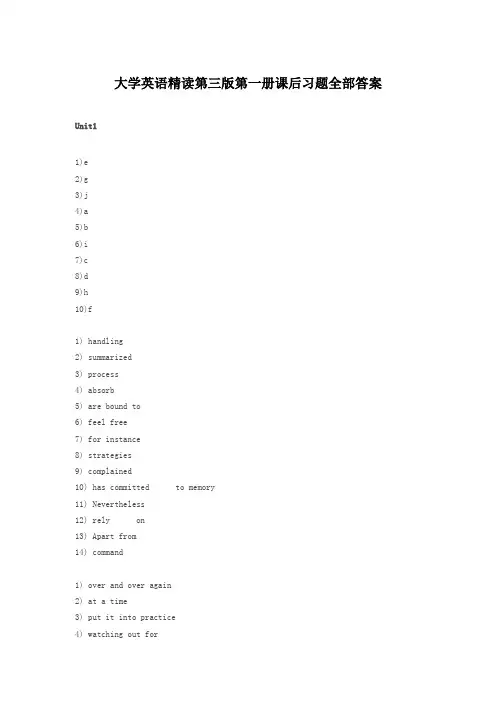
大学英语精读第三版第一册课后习题全部答案Unit11)e2)g3)j4)a5)b6)i7)c8)d9)h10)f1) handling2) summarized3) process4) absorb5) are bound to6) feel free7) for instance8) strategies9) complained10) has committed to memory11) Nevertheless12) rely on13) Apart from14) command1) over and over again2) at a time3) put it into practice4) watching out for5) by no means6) concentrate on7) In addition t8) in detail1)action2)employ3)announce4)examination5)communication6)express7)compose8)improvement9)concentration10)management11)consider12)motivate13)development14)movement15)discuss16)operate17)division18)production19)educate20)repeat1) additional2) add3) addition4) addition1) effectively2) effect3) effective4) effect1) helpful2) help3) helpless4) help5) helplessly6) helpfully7) helpful1) reliant2) reliable3) reliance reliable4) relies5) reliably6)1) repetition2) repeating3) repeatedly4) repeated5) repetition1) In my opinion2) According to Mary3) In our opinion4) According to today's papers5) In most doctors' opinion According to most doctors1) Shakespeare was not only a dramatist but also an actor.2) Miss Crain not only took me home in her car, but also came the next day to see if I had recovered.3) Hainan Island attracts tourists not only in winter but also in summer.4) There is always a black market not only in Britain, but also in other European countries.5) At the Athens Olympics in 2004, Liu Xiang not only won a gold medal in the 110-meter hurdles, but also broke the Olympic record.1) It is true that your sentences are all grammatically correct, but they don’t make any sense.2) It is true that they lost that battle, but they still went on fighting.3) It is true that Tom’s very clever and hardworking, but I still don’t think he is the right person for the job.4) It is true that learning English is by no means easy, but we can make the task easier by using some learning strategies.1) strategies2) frequently3) over and over again4) commit to memory5) acquaintance6) watch out for7) communicate8) process9) opportunities10) rely on11) put into practice12) absorbed1) if2) about3) it4) know5) up6) as7) addition8) even9) into10) other11) for12) while1) memorize2) a matter of3) taught4) shelf5) realize6) written7) idiomatic8) join in9) difference10) gain a good command翻译1) 史密斯太太对我抱怨说,她经常发现与自己十六岁的女儿简直无法沟通。
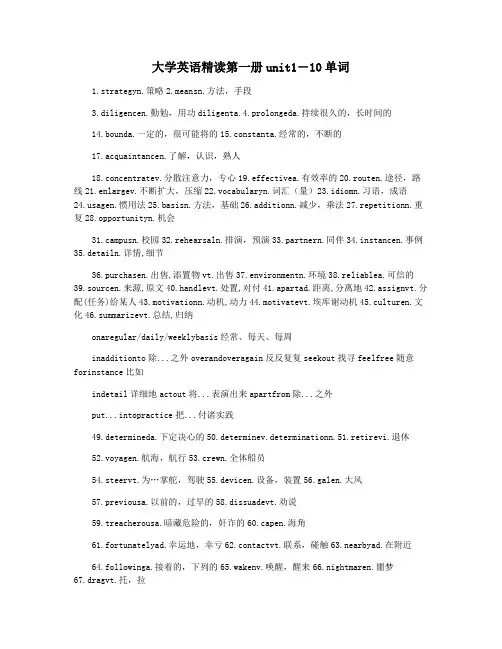
大学英语精读第一册unit1―10单词1.strategyn.策略2.meansn.方法,手段3.diligencen.勤勉,用功diligenta.4.prolongeda.持续很久的,长时间的14.bounda.一定的,很可能将的15.constanta.经常的,不断的17.acquaintancen.了解,认识,熟人18.concentratev.分散注意力,专心19.effectivea.有效率的20.routen.途径,路线21.enlargev.不断扩大,压缩22.vocabularyn.词汇(量)23.idiomn.习语,成语agen.惯用法25.basisn.方法,基础26.additionn.减少,乘法27.repetitionn.重复28.opportunityn.机会31.campusn.校园32.rehearsaln.排演,预演33.partnern.同伴34.instancen.事例35.detailn.详情,细节36.purchasen.出售,添置物vt.出售37.environmentn.环境38.reliablea.可信的39.sourcen.来源,原文40.handlevt.处置,对付41.apartad.距离,分离地42.assignvt.分配(任务)给某人43.motivationn.动机,动力44.motivatevt.埃库谢动机45.culturen.文化46.summarizevt.总结,归纳onaregular/daily/weeklybasis经常、每天、每周inadditionto除...之外overandoveragain反反复复seekout找寻feelfree随意forinstance比如indetail详细地actout将...表演出来apartfrom除...之外put...intopractice把...付诸实践49.determineda.下定决心的50.determinev.determinationn.51.retirevi.退休52.voyagen.航海,航行53.crewn.全体船员54.steervt.为…掌舵,驾驶55.devicen.设备,装置56.galen.大风57.previousa.以前的,过早的58.dissuadevt.劝说59.treacherousa.暗藏危险的,奸诈的60.capen.海角61.fortunatelyad.幸运地,幸亏62.contactvt.联系,碰触63.nearbyad.在附近64.followinga.接着的,下列的65.wakenv.唤醒,醒来66.nightmaren.噩梦67.dragvt.托,拉74.undoubtedlyad.无疑地75.moreoverad.此外,而且76.beingn.生物,人77.rarea.罕见的,不常发生的78.occasionn.时刻,时机,场合79.mayorn.市长 80.contenta.令人满意的,高兴的。
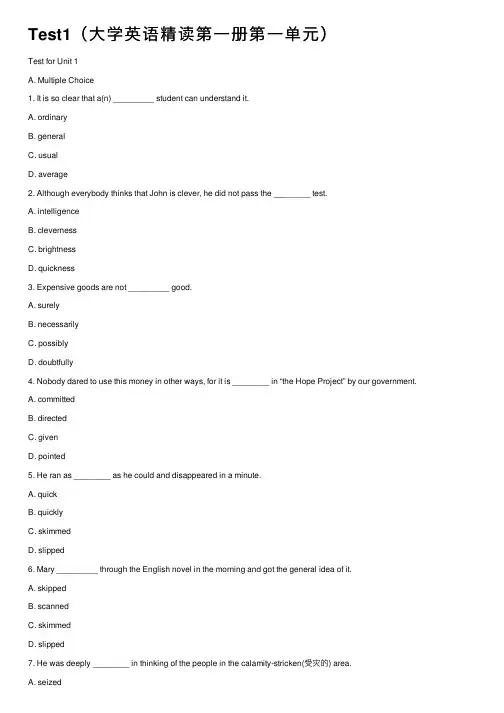
Test1(⼤学英语精读第⼀册第⼀单元)Test for Unit 1A. Multiple Choice1. It is so clear that a(n) _________ student can understand it.A. ordinaryB. generalC. usualD. average2. Although everybody thinks that John is clever, he did not pass the ________ test.A. intelligenceB. clevernessC. brightnessD. quickness3. Expensive goods are not _________ good.A. surelyB. necessarilyC. possiblyD. doubtfully4. Nobody dared to use this money in other ways, for it is ________ in “the Hope Project” by our government.A. committedB. directedC. givenD. pointed5. He ran as ________ as he could and disappeared in a minute.A. quickB. quicklyC. skimmedD. slipped6. Mary _________ through the English novel in the morning and got the general idea of it.A. skippedB. scannedC. skimmedD. slipped7. He was deeply ________ in thinking of the people in the calamity-stricken(受灾的) area.A. seizedD. occupied8. If he _______ of all the dangers, he should change his mind.A. knowsB. be clearC. hearsD. be aware9. Because of the heavy fog, we arrived in Shanghai behind ________.A. timeB. timetableC. planD. schedule10. It is a Japanese _______ to take off one’s shoes before entering a house.A. hobbyB. customC. habitD. customs11. What ________ do you like best after class?A. actB. actionC. activityD. active12. That was perhaps the _______ that he failed the exam.A. caseB. situationC. stateD. factor13. Playing violin is my favourite _______.A. relaxmentB. relaxationC. entertainationD. entertainment14. When you meet with a problem, find a way to ________ it.A. answerD. settle15. The ________ temperature of the human body is between 36℃ and 37℃.A. normalB. naturalC. regularD. formalB. Reading ComprehensionNow let us look at how we read. When we read a printed text, our eyes move across a page in short, jerky movement. We recognize words usually when our eyes are still when they fixate. Each time they fixate, we see a group of words. This is known as the recognition span or the visual span. The length of time for which the eyes stop ---the duration of the fixation ----varies considerably from person to person. It also varies within any one person according to his purpose in reading and his familiarity with the text. Furthermore, it can be affected by such factors as lighting and tiredness. Unfortunately, in the past, many reading improvement courses have concentrated too much on how our eyes move across the printed page. As a result of this misleading emphasis on the purely visual aspects of reading, numerous exercises have been devised to train the eyes to see more words at one fixation. For instance, in some exercises, words are flashed on to a screen for, say, a tenth or a twentieth of a second. One of the exercises has required students to fix their eyes on some central point, taking in the words on either side. Such word patterns are often constructed in the shape of rather steep pyramids so the reader takes in more and more words at each successive fixation. All these exercises are very clever, but it’s one thing to improve a person’s ability to see words and quite another thing to improve his abili ty to read a text efficiently. Reading requires the ability to understand the relationship between words. Consequently, for these reasons, many experts have now begun to question the usefulness of eye training, especially since any approach which trains a person to read isolated words and phrases would seem unlikely to help him in reading a continuous text.1. The time of the recognition span can be affected by the following facts except ________ .A. one’s familiarity with the textB. one’s purpose i n readingC. the length of a group of wordsD. lighting and tiredness2. The author may believe that reading ______.A. requires a reader to take in more words at each fixationB. requires a reader to see words more quicklyC. demands an deeply-participating mindD. demands more mind than eyes3. What does the author mean by saying “but it’s one thing to improve a person’sability to see words and quite another thing to improve his ability to read a text e fficiently.” in the second para graph?A. The ability to see words is not needed when an efficient reading is conducted.B. The reading exercises mentioned can’t help to improve both the ability to see and to comprehend words.C. The reading exercises mentioned can’t help to improve an efficient reading.D. The reading exercises mentioned has done a great job to improve one’s ability to see words.4. Which of the following is NOT true?A. The visual span is a word or a group of words we see each time.B. Many experts began to question the efficiency of eye training.C. The emphasis on the purely visual aspects is misleading.D. The eye training will help readers in reading a continuous text.5. The tune of the author in writing this article is ________A. criticalB. neutralC. pessimisticD. optimisticC. ClozeMethods of studying vary; what works__1__ for some students doesn’t work at all for others. The only thing you can do is experiment __2__ you find a system that does work for you. But two things are sure: __3__ else can do your studying for you, and unless you do find a system that works, you won' t although college. Meantime, there are a few rules that__4__ for everybody. The hint is "don't get ___5___ ".The problem of studying, __6__ enough to start with, becomes almost__7__ when you are trying to do __8__ in one weekend. __9__ the fastest readers have trouble__10__ that. And if you are behind in written work that must be __11__, the teacher who accepts it __12__late will probably not give you good credit. Perhaps he may not accept it__13__ . Getting behind in one class because you are spending so much time on another is really no __14__. Feeling pretty virtuous about the seven hours you'spend on chemistry won' t __15__one bit if the history teacher pops a quiz. And many freshmen do get into trouble by spending too much time on one class at the __16__of the others, either because they like one class much better or because they find it so much harder that they think, they should __17__all their time to it. __18__the reason, going the whole work for one class and neglecting the rest of them is a mistake, if you face this __19__, begin with the shortest and easiest __20__. Get them out of the way and then go to the more difficult, time consuming work.1. A) good B) easily C) sufficiently D) well2. A) until B) after C) while D ) so3. A) somebody B) nobody C) everybody D) anybody4. A) follow B) go C) operate D) work5. A) behind B) after C) slow D) later6. A) hardly B) unpleasant C) hard D) heavy7. A) improbable B) necessary C) impossible D) inevitable8. A) three week's work B) three weeks' worksC) three weeks' work D) three week' s works9. A) Even B) Almost C) If D) with10. A) to do B) doing C) at doing D) with doing11. A) turned in B) tuned up C) turned out D) given in12. A) very B) quite C) such D) that13. A) anyway B) either C) at all D) too14. A) solution B) method C) answer D) excuse15. A) help B) encourage C) assist D) improve16. A) expense B) pay C) debt D) charge17. A) devote B) put C) spend D) take18. A) Whichever B) Whatever C) However D) Wherever19. A) attraction B) decision C) temptation D) dilemma20. A) arrangements B) way C) assignments D) classD. Listen to the passage twice and fill in the blanks.English as an International LanguageInternational languages include both___1____languages that have become international means of communication and languages___2____this purpose. The most famous and____3___artificial international language is Esperanto; however, the most widespread international language is not artificial. Today, English is used in more countries as an____4____language or as the main means of international communication than any other language. ____5____billion people live in countries where English has official_____6___. One out of five of the world’s population speaks some English. And at __7___ one in five is learning English. About ___8____ of the world’s_____9____ is written in English. And 90% of all information in the world’s electronic____10___systems is stored in English.单元测试答题纸(1)A. Multiple ChoiceB. Reading ComprehensionC. ClozeD. Listen to the passage twice and fill in the blanks.。
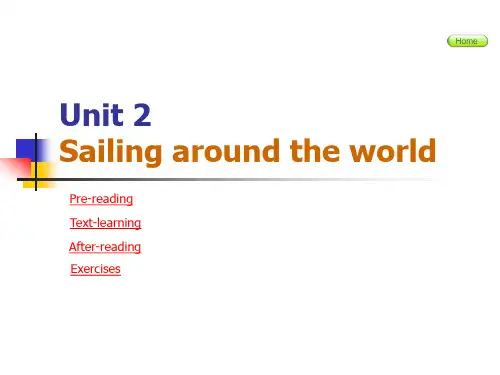
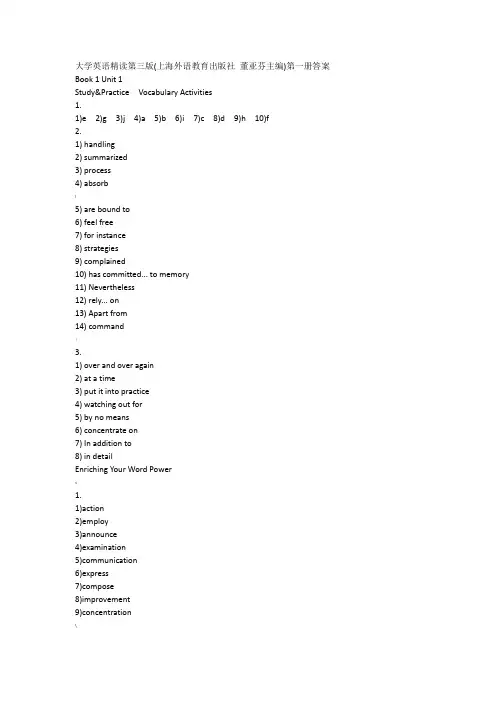
大学英语精读第三版(上海外语教育出版社董亚芬主编)第一册答案Book 1 Unit 1Study&Practice Vocabulary Activities1.1)e 2)g 3)j 4)a 5)b 6)i 7)c 8)d 9)h 10)f2.1) handling2) summarized3) process4) absorb!5) are bound to6) feel free7) for instance8) strategies9) complained10) has committed... to memory11) Nevertheless12) rely... on13) Apart from14) command)3.1) over and over again2) at a time3) put it into practice4) watching out for5) by no means6) concentrate on7) In addition to8) in detailEnriching Your Word Power<1.1)action2)employ3)announce4)examination5)communication6)express7)compose8)improvement9)concentration\10)management11)consider12)motivate13)development14)movement15)discuss16)operate17)division18)production19)educate】20)repeat2.1) a) additional b) add c) addition d) addition2) a) effectively b) effect c) effective d) effect3) a)helpful b) help c) helpless d) help e) helplessly f) helpfully g) helpful4) a) reliant b) reliable c) reliance, reliable d) relies e) reliably5) a) repetition b) repeating c) repeatedly d) repeated e) repetitionUsage1) In my opinion2) According to Mary【3) In our opinion4) According to today’s papers5) In most doctors’ opinion ( According to most doctors)Structure1.1) Shakespeare was not only a dramatist but also an actor.2) Miss Crain not only took me home in her car, but also came the next day to see if I had recovered.3) Hainan Island attracts tourists not only in winter but also in summer.4) There is always a black market not only in Britain, but also in other European countries.5) At the Athens Olympics in 2004, Liu Xiang not only won a gold medal in the 110-meter hurdles, but also broke the Olympic record.>2.1) It is true that your sentences are all grammatically correct, but they don’t make any sense.2) It is true that they lost that battle, but they still went on fighting.3) It is true that Tom’s very clever and hardworking, but I still don’t think he is the right person for the job.4) It is true that learning English is by no means easy, but we can make the task easier by using some learning strategies.Cloze1.1) strategies2) frequently3) over and over again-4) commit to memory5) acquaintance6) watch out for7) communicate8) process9) opportunities10) rely on11) put into practice12) absorbed2.[1) if2) about3) it4) know5) up6) as7) addition8) even9) into10) other`11) for12) whileSpot Dictation1) memorize2) a matter of3) taught4) shelf5) realize6) written7) idiomatic(8) join in9) difference10) gain a good commandTranslation1) 史密斯太太对我抱怨说,她经常发现与自己十六岁的女儿简直无法沟通。
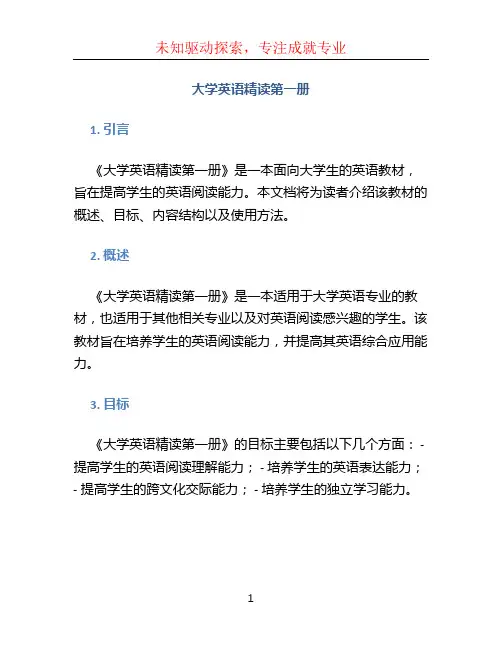
大学英语精读第一册1. 引言《大学英语精读第一册》是一本面向大学生的英语教材,旨在提高学生的英语阅读能力。
本文档将为读者介绍该教材的概述、目标、内容结构以及使用方法。
2. 概述《大学英语精读第一册》是一本适用于大学英语专业的教材,也适用于其他相关专业以及对英语阅读感兴趣的学生。
该教材旨在培养学生的英语阅读能力,并提高其英语综合应用能力。
3. 目标《大学英语精读第一册》的目标主要包括以下几个方面: - 提高学生的英语阅读理解能力; - 培养学生的英语表达能力;- 提高学生的跨文化交际能力; - 培养学生的独立学习能力。
4. 内容结构《大学英语精读第一册》的内容结构分为十个单元,每个单元都包含了以下几个部分: - Warm-up:旨在引发学生对主题的兴趣,通过图片、问题或小故事引导学生进行讨论和思考。
- Reading Skills:通过教授阅读技巧和策略来提高学生的阅读能力,如词汇理解、词义推测、主旨概括等。
- Reading Comprehension:包含一篇主题相关的英语原著文章,并通过问题回答、填空、判断等形式来检验学生对文章内容的理解。
- Vocabulary Building:介绍与文章主题相关的重点词汇,并提供词汇练习和扩展训练。
- Language Focus:通过语法、词汇、短语等方面的训练来提高学生的语言表达能力。
- Cultural Corner:介绍与文章主题相关的跨文化知识和背景,拓宽学生的视野和跨文化交际能力。
- Real-Life Reading:通过现实生活中的真实场景和材料来训练学生的英语阅读能力,并使学生将所学知识应用于实际情境中。
5. 使用方法《大学英语精读第一册》的使用方法主要包括以下几个方面: 1. 与教师指导:根据教师的指导,按照教学计划进行学习和阅读训练。
2. 自主学习:根据个人时间和进度,自主学习教材的每个单元,并完成相关的练习和任务。
3. 合作学习:与同学进行合作学习,相互讨论、分享彼此的理解和感悟,提高学习效果。
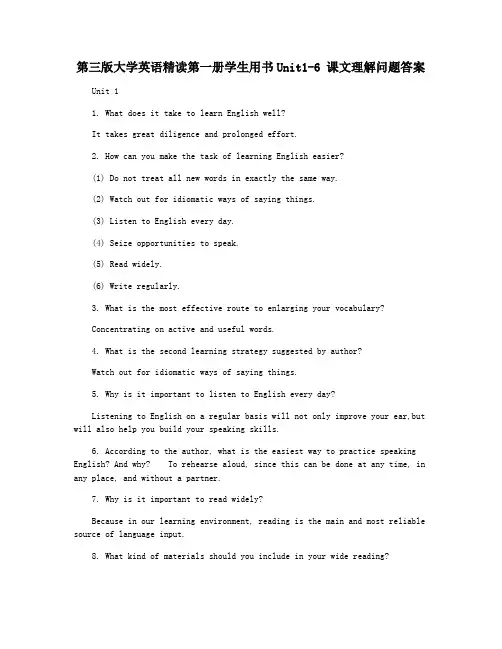
第三版大学英语精读第一册学生用书Unit1-6 课文理解问题答案 Unit 11. What does it take to learn English well?It takes great diligence and prolonged effort.2. How can you make the task of learning English easier?(1) Do not treat all new words in exactly the same way.(2) Watch out for idiomatic ways of saying things.(3) Listen to English every day.(4) Seize opportunities to speak.(5) Read widely.(6) Write regularly.3. What is the most effective route to enlarging your vocabulary?Concentrating on active and useful words.4. What is the second learning strategy suggested by author?Watch out for idiomatic ways of saying things.5. Why is it important to listen to English every day?Listening to English on a regular basis will not only improve your ear,but will also help you build your speaking skills.6. According to the author, what is the easiest way to practice speaking English? And why? To rehearse aloud, since this can be done at any time, in any place, and without a partner.7. Why is it important to read widely?Because in our learning environment, reading is the main and most reliable source of language input.8. What kind of materials should you include in your wide reading?Things that you find interesting, that you can understand without relying too much on a dictionary.9. Apart from your teacher's writing assignment, what other ways of writing does the author suggest?Keeping a pen pal, keeping a diary, writing a short story and summarizing the daily news.10. What is the author's conclusion at the end of the article?It pays to absorb as much as you can from reading and listening and then try to put what you have learned into practice through speaking and writing.Unit 21. What happened to Francis Chichester in 1931?He had tried to fly around the world but failed.2. How old was he when he started his voyage round the world?653. What was the name of his boat? What was the length of the boat?Gipsy Moth ; 16-meter-long.4. What route did Chichester follow in sailing round the world?The route of the great 19th Century clippers ships.感谢您的阅读,祝您生活愉快。
---------------------------------------------------------------最新资料推荐------------------------------------------------------新视野大学英语第三版读写教程第一册-unit2-课后题答案Section A Exercise1/ 34Understanding the text1. Why did the daughter buy a large and expensive vehicle according to the mother? (Para.1) Answer: The daughter bought a large and expensive vehicle probably because her mother advised her to buy a practicle and gas-efficient car. The daughter did this on purpose because at this age, she was being rebellious.---------------------------------------------------------------最新资料推荐------------------------------------------------------ 2. What does the mother want to tell through the fact that her daughter has bought a truck instead of a car and that she is still watching cartoons? (Para.23)Answer : The mother wants to show that although her daughter tries to show she is an adult, actually she is not.3/ 343. How does the mother feel when her daughter is leaving? (Para.4)Answer: The mother is happy that her daughter is finally independent now, but on the other hand, she feels doubtful whether her daughter could take good care of herself.---------------------------------------------------------------最新资料推荐------------------------------------------------------ 4. Why does the mother describe in great detail the mess in her daughter's room? (Para 5-11) Answer: The mother wants to show that her daughter is not ready to be an adult yet.5/ 345. How does the mother decide to deal with her daughter's books? (Para. 7) Answer: The mother puts her daughter's books onto a single shelf to deal with later.---------------------------------------------------------------最新资料推荐------------------------------------------------------ 6. What makes the mother change her attitude toward her daughter? (Para. 13) Answer: The mother finds an envelope with items such as old family photos, letters, greeting cards, and love notes they gave their daughter and sees the words " DO NOT THROW AWAY" marked on the envelope. Her attitude then changes.7/ 347. How does the mother reverse herself in dealing with her daughter's clothes and stuffed animals? (Para.16) Answer: At first, the mother decides to throw some of the items away and donate the rest to charity. After she sees the brown envelope, she changes her mind and put them back in place.---------------------------------------------------------------最新资料推荐------------------------------------------------------ 8. Why does the mother feel confident that her daughter will come back one day? (Para.22) Answer: Because the mother knows that the sweet childhood memories will bring her daughter back.9/ 34Words in use3 fill in the blanks with the words given below.1. 3. 5. 7. 9. awaits donation stuffed emotional dump2. efficiency 4. polished 6. historical 8. embarrassed 10. curb---------------------------------------------------------------最新资料推荐------------------------------------------------------ Word Building-er vt. n. n. people who do the action (job taker) doer \ movie goer \ skier \owner \ payer \ buyer \ leader\ stockholder \ killer\ climber \ player\ founder\ cooker \ dryer \ cooler\drawer \opener -or / -ar beggar \ liar \ doctor \tutor \ director \ collector \instructor11/ 34freespender(挥金如土者); firstcomer(先到者); woodpecker (啄木鸟); troublemaker(惹是生非者); tailender(倒数第一); fortuneteller (算命先生)---------------------------------------------------------------最新资料推荐------------------------------------------------------ NewYorker (纽约人); Icelander(冰岛人) Londoner(伦敦人); West Pointer(美国西点军佼学生) Long Marcher(参加过中国二万五千里长征的人)13/ 34-ic “-ic”常常加在名词或依附于词干后,构成形容词,意为“……的”、“……似的”、“ 与……有关的”等。
UNIT 1TEXTWant to know how to improve your grades without having to spend more time studying? Sounds too good to be true? Well, readon...How to Improve Your Study Habitsperhaps you are an average student with average intelligence. Youdo well enough in school, but you probably think you will never bea top student. This is not necessarily the case, however. You can receive better grades if you want to. Yes, even students of averageintelligence can be top students without additional work. Here's how:1. Plan your time carefully. Make a list of your weekly tasks.Then make a schedule or chart of your time. Fill in committed timesuch as eating, sleeping, meetings, classes, etc. Then decide on good, regular times for studying. Be sure to set aside enough timeto complete your normal reading and work assignments. Of course,studying shouldn't occupy all of the free time on the schedule. It's important to set aside time for relaxation, hobbies, and entertainment as well. This weekly schedule may not solve all of your problems, but it will make you more aware of how you spendyour time. Furthermore, it will enable you to plan your activities sothat you have adequate time for both work and play.2. Find a good place to study. Choose one place for your studyarea. It may be a desk or a chair at home or in the schoo l library,but it should be comfortable, and it should not have distractions. When you begin to work, you should be able to concentrate on thesubject.3. Skim before you read. This means looking over a passagequickly before you begin to read it more carefully. As you previewthe material, you get some idea of the content and how it is organized. Later when you begin to read you will recognize less important material and you may skip some of these portions. Skimming helps double your reading speed and improves your comprehension as well.4. Make good use of your time in class. Listening to what theteacher says in class means less work later. Sit where you can see and hear well. Take notes to help you remember what the teacher says.5. Study regularly. Go over your notes as soon as youcanafter class. Review important points mentioned in class as well aspoints you remain confused about. Read about these points in yourtextbook. If you know what the teacher will discuss the next day, skim and read that material too. This will help you understand thenext class. If you review your notes and textbook regularly, the material will become more meaningful and you will remember it longer. Regular review leads to improved performance on test.6. Develop a good attitude about tests. The purpose of a test isto show what you have learned about a subject. The world won't end if you don't pass a test, so don't worry excessively about a single test. Tests provide grades, but they also let you know what you need to spend more time studying, and they help make your knowledge permanent.There are other techniques that might help you with your studying. Only a few have been mentioned here. You will probablydiscover many others after you have tried these. Talk with your classmates about their study techniques. Share with them some ofthe techniques you have found to be helpful. Improving your studyhabits will improve your grades.NEW WORDSaveragen. ordinary 普通的;中等的intelligencen. ability to learn and understand 智力necessarilyad. inevitably 必定casen. what has really happened; actual condition 实情additionala. added 附加的,额外的n. additionweeklya. done or happening every week 每周的;一周一次的schedulen. timetable 时间表chartn. (sheet of paper with) information written or drawn in the formof a picture 图(表)commitvt. 指定...用于asidead. to the side 在旁边;到(向)一边etc(Latin, shortened form for et cetera) and other things 等等normala. usual 正常的readingn. the act or practice of reading 阅读assignmentn. sth. given out as a task (布置的)作业occupyn. take up 占用relaxationn. (sth. done for) rest and amusement 休息,娱乐relaxv.hobbyn. what one likes to do in one's free time 业余爱好entertainmentn. show, party, etc. that people enjoy 娱乐entertainvt.solvevt. find an answer to (a problem) 解决(问题)awarea. having knowledge or understanding 知道的;意识到的furthermoread. moreover; in addition 而且;此外enablevt. make (sb.) able (to do sth.) 使(某人)能(做某事)activityn. sth. (to be) done 活动adequatea. as much as one needs; enough 充分的;足够的distractionn. sth. that draws away the mind or attention 分心(或分散注意力)的事物concentrate (on or upon)vi. pay close attention (to) 全神贯注(于)skimvt. read quickly to get the main ideas (of) 略读previewvt. have a general view of (sth.) beforehand 预习contentn. what is written in a book, etc. 内容organizevt. form into a whole 组织laterad. 后来;以后skipvt. pass over 略过portionn. part; share 一部分;一份doublev. make or become twice as great or as many (使)增加一倍comprehensionn. the act of understanding or ability to understand 理解(力)mentionvt. speak or write about (sth.) in a few words 提及confuseda. mixed up in one's mind 迷惑的,混淆的confusevt.textbookn. a standard book for the study of a subject 教科书;课本performancen. achievement 成绩meaningfula. having important meaning or value 富有意义的attituden. what one thinks about sth. 态度,看法purposen. aim 目的,意图excessivelyad. too much 过多地,过分地excessivea.permanenta. lasting for a long time; never changing 持久的;永久的techniquen. way of doing sth. 技巧,方法helpfula. useful; providing help or wiling to help 有益的;给予帮助的,肯帮忙的PHRASES & EXPRSSIONSfill inwrite in 填写,填充decide onmake a choice or decision about 选定,决定set asidesave for a special purpose 留出as wellalso; too; in addition 也,还;同样be aware (of)know (sth.); know (what is happening) 知道,意识到concentrate ondirect one's attention, efforts, etc. to 全神贯注于look overexamine (quickly) 把...看一遍,过目go overreview 复习lead toresult in 导致UNIT 2TEXTAt sixty-five Francis Chichester set out to sail single-handed roundthe world. This is the story of that adventure.Sailing Round the WorldBefore he sailed round the world single-handed, Francis Chichesterhad already surprised his friends several times. He had tried to flyround the world but failed. That was in 1931.The years passed. He gave up flying and began sailing. He enjoyed it greatly. Chichester was already 58 years old when he won the first solo transatlantic sailing race. His old dream of goinground the world came back, but this time he would sail. His friendsand doctors did not think he could do it, as he had lung cancer. ButChichester was determined to carry out his plan. In August, 1963,at the age of nearly sixty-five, an age when many men retire, he began the greatest voyage of his life. Soon, he was away in this new 16-metre boat, Gipsy Moth.Chichester followed the route of the great nineteenth century clipper ships. But the clippers had had plenty of crew. Chicheater did it all by himself, even after the main steering device had been damaged by gales. Chichester covered 14, 100 miles beforestopping in Sydney, Australia. This was more than twice the distance anyone had previously sailed alone.He arrived in Australia on 12 December, just 107 days outfrom England. He received a warm welcome from the Australiansand from his family who had flown there to meet him. On shore, Chichester could not walk without help. Everybody said the same thing: he had done enough; he must not go any further. But he didnot listen.After resting in Sydney for a few weeks, Chichester set off once more in spite of his friends' attempts to dissuade him. The second half of his voyage was by far the more dangerous part, during which he sailed round the treacherous Cape Horn.On 29 January he left Australia. The mext night, the blackesthe had ever known, the sea became so rough that the boat almost turned over. Food, clothes, and broken glass were all mixed together. Fortunately, bed and went to sleep. When he woke up, thesea had become calm the nearest person he could contact by radio,unless there was a ship nearby, Wild be on an island 885 miles away.After succeeding in sailing round Cape Horn, Chichester sentthe followiing radio message to London:" I feel as if I had wakened from a nightmare. Wild horses could not drag me down toCape Horn and that sinister Southern Ocean again."Juat before 9 o'clock on Sunday evening 28 May, 1967, he aeeived back in England, where a quarter of a million people werewaiting to welcome him. Queeh Elizabeth II knigthed him with thevery sword that Queen Elizabeth I had sailed round the world for the first time. The whole voyage from England and back had covered 28, 500 miles. It had taken him nine months , of which thesailing time was 226 days. He had done what he wanted to accomplish.Like many other adventurers, Chichester had experienced fearand conquered it. In doing so, he had undoubtedly learnt somethingabout himself. Moreover, in the modern age when human beings depend so much on machines, he had given men throughout the world new pride.NEW WORDSsingle-handeda & ad. (done) by one person alone 单独的(地)adventuren. 冒险(活动)soloa. single-handed 单独的transatlantica. crossing the Atlantic Ocean 横度大西洋lungn. part of the body with which one breathes 肺cancern. 癌determineda. with one's mind firmly made up 下定了决心的determinev.determinationn.retirevi. stop working at one's job(because of age) 退休voyagen. sea journey 航海;航行routen. way from one place to another 路线clippern. 快速帆船crewn. group of people who work together on a ship or aeroplane 全体船员;全体乘务员steervt. make (esp. a boat or road vehicle) go in a particular direction 为...撑舵devicen. a piece of equipment 设备;装置steering devicen. 操舵装置damagevt. cause harm or injury to 损坏ad. harm, injury 损坏galen. very strong wind 大风covervt. travel (a certain distance) 行过(一段距离)previouslyad. before 以前previousa.attemptn. try 试图,尝试dissuadevt. prevent (sb.) from doing sth. by reasoning 劝阻treacherousa. more dangerous than it seems 暗藏危险的;奸诈的capen. 海角rougha. (of weather or the sea) stormy; not calm (气候)有暴风雨的;(海)波涛汹涌的fortunatelyad. luckily 幸运地;幸亏fortunatea.contactvt. get in touch with 联系,接触nearbyad. close by 在附近followinga. next; to be mentioned immediately 接着的;下列的wakenv. (cause to) wake 唤醒;醒来nightmaren. terrible dream 恶梦dragvt. pull along with great effort 拖,拉sinistera. 凶恶的,邪恶的knightn. 爵士vt. 封... 为爵士swordn. 剑,刀accomplishvt. finish successfully 完成conquervt. overcome 征服undoubtedlyad. certainly 无疑地moreoverad. in addition 此外,而且humana. of or concerning people 人们beingn. a living thing, esp. a person 生物;人PHRASES & EXPRESSIOMSset outbegin a course if action 着手,开始give upatop doing 放弃be determined to (do)have a strong will to (do) 决心(做)(all) by oneself(completely) alonein spite ofnot taking notice of; not caring about 尽管;虽然by farby a large amount or degree...得多turn over(cause to) fall over, upset (使)翻倒,(使)倾覆can not helpcan not keep oneself from 禁不住PEOPER NAMESFrancis Chichester弗朗西斯. 奇切斯特Gipsy Moth吉普赛. 莫斯Sydney悉尼(澳大利亚城市)Cape Horn合恩角(智利)London伦敦Elizabeth伊丽莎白(女子名)Drake德雷克(姓氏)UNIT 3TEXTThey say that blood is thicker than water, that our relatives are more important to us than others. Everyone was so kind to the oldlady on her birthday. Surely her daughter would make an even bigger effort to please he?The PresentIt was the old lady's birthday.She got up early to be ready for the post. From the secondfloor flat she could see the postman when he came down the street,and the little boy from the ground floor brought up her letters on the rare occasions when anything came.Today she was sure the would be something. Myra wouldn't forget her mother's birthday, even if she seldom wrote at other times. Of course Myra was busy. Her husband had been made Mayor, and Myra herself had got a medal for her work the aged.The old lady was proud of Myra, but Enid was the daughtershe loved. Enid had never married, but had seemed content to live。
大学英语精读第一册unit10参考答案大学英语精读第一册Unit 10 参考答案Part I: Vocabulary and Structure1. The correct answer is D. "contemplate" means to think about something carefully, especially a possible action.2. The answer is B. "innovate" refers to the act of introducing new ideas, methods, or products.3. The correct answer is C. "foster" means to encourage the development of something, especially something good.4. The answer is A. "envision" means to form a mental image or concept of something.5. The correct answer is D. "interact" means to communicate or cooperate with others, often in a reciprocal manner.6. The answer is B. "manifest" can mean to become visible or clear, or to display a particular quality.7. The correct answer is C. "perceive" means to become aware or conscious of something.8. The answer is A. "prioritize" means to treat someone or something as more important than others.9. The correct answer is D. "substantiate" means to provide proof or evidence for a claim.10. The answer is B. "utilize" means to use something for a practical purpose.Part II: Reading Comprehension1. Question 1: The answer is B. The passage mentions that the author's first encounter with the book was in high school, indicating that it was not a new discovery.2. Question 2: The correct answer is C. The author describes the book as a source of inspiration and a guide, which suggests a profound impact.3. Question 3: The answer is A. The author discusses the book's influence on their personal growth and development.4. Question 4: The correct answer is D. The passage indicates that the author revisited the book in college and found new insights, showing a continued relevance.5. Question 5: The answer is B. The author reflects on the book's ability to offer different perspectives at different times, suggesting a timeless quality.Part III: Cloze Test1. The correct word to fill in the first blank is inspired,as the context suggests that the author was motivated by the book.2. The second blank should be filled with contemplated, indicating that the author thought deeply about the book's content.3. For the third blank, the word manifested is appropriate, as it shows that the book's influence became clear.4. The fourth blank requires prioritized, indicating that the author considered the book's lessons important.5. The fifth blank should be filled with interacted, as it implies that the author engaged with the book's ideas.6. The sixth blank is best filled with utilized, suggesting that the author applied the book's teachings.7. For the seventh blank, substantiated is the correct word, as it implies that the author found evidence for the book's claims.8. The eighth blank should be filled with perceived, indicating that the author recognized the book's value.9. The ninth blank requires fostered, as it suggests that the author nurtured the qualities mentioned in the book.10. The final blank is best filled with innovated, indicating that the author introduced new ideas inspired by the book.Part IV: Translation1. The correct translation for the first sentence is: "The book has had a profound impact on my life and has guided me through many challenging times."2. The second sentence should be translated as: "Whenever I reread it, I find new insights and perspectives that I hadn't noticed before."3. The translation for the third sentence is: "It has taught me the importance of self-reflection and the value of continuous learning."4. The fourth sentence should be translated as: "The lessons from the book have become a part of my personal philosophy and have shaped my approach to life."5. The final sentence translates to: "I believe that the wisdom contained in this book is timeless and will continue to inspire generations to come."Part V: WritingFor the writing section, the answer would typically involve a personal essay or response to a prompt related to the unit's theme. Since the prompt is not provided, a sample answer cannot be given. However, students should ensure theirwriting is coherent, well-structured, and addresses the topic with relevant examples and analysis.Please note that the actual content of the unit, including vocabulary, reading passages, and exercises, would be necessary to provide accurate answers. The above answers are hypothetical and meant to serve as an example of what the reference answers might look like.。
---------------------------------------------------------------最新资料推荐------------------------------------------------------新视野大学英语第三版读写教程第一册-unit2-课后题答案Section A Exercise1/ 34Understanding the text1. Why did the daughter buy a large and expensive vehicle according to the mother? (Para.1) Answer: The daughter bought a large and expensive vehicle probably because her mother advised her to buy a practicle and gas-efficient car. The daughter did this on purpose because at this age, she was being rebellious.---------------------------------------------------------------最新资料推荐------------------------------------------------------ 2. What does the mother want to tell through the fact that her daughter has bought a truck instead of a car and that she is still watching cartoons? (Para.23)Answer : The mother wants to show that although her daughter tries to show she is an adult, actually she is not.3/ 343. How does the mother feel when her daughter is leaving? (Para.4)Answer: The mother is happy that her daughter is finally independent now, but on the other hand, she feels doubtful whether her daughter could take good care of herself.---------------------------------------------------------------最新资料推荐------------------------------------------------------ 4. Why does the mother describe in great detail the mess in her daughter's room? (Para 5-11) Answer: The mother wants to show that her daughter is not ready to be an adult yet.5/ 345. How does the mother decide to deal with her daughter's books? (Para. 7) Answer: The mother puts her daughter's books onto a single shelf to deal with later.---------------------------------------------------------------最新资料推荐------------------------------------------------------ 6. What makes the mother change her attitude toward her daughter? (Para. 13) Answer: The mother finds an envelope with items such as old family photos, letters, greeting cards, and love notes they gave their daughter and sees the words " DO NOT THROW AWAY" marked on the envelope. Her attitude then changes.7/ 347. How does the mother reverse herself in dealing with her daughter's clothes and stuffed animals? (Para.16) Answer: At first, the mother decides to throw some of the items away and donate the rest to charity. After she sees the brown envelope, she changes her mind and put them back in place.---------------------------------------------------------------最新资料推荐------------------------------------------------------ 8. Why does the mother feel confident that her daughter will come back one day? (Para.22) Answer: Because the mother knows that the sweet childhood memories will bring her daughter back.9/ 34Words in use3 fill in the blanks with the words given below.1. 3. 5. 7. 9. awaits donation stuffed emotional dump2. efficiency 4. polished 6. historical 8. embarrassed 10. curb---------------------------------------------------------------最新资料推荐------------------------------------------------------ Word Building-er vt. n. n. people who do the action (job taker) doer \ movie goer \ skier \owner \ payer \ buyer \ leader\ stockholder \ killer\ climber \ player\ founder\ cooker \ dryer \ cooler\drawer \opener -or / -ar beggar \ liar \ doctor \tutor \ director \ collector \instructor11/ 34freespender(挥金如土者); firstcomer(先到者); woodpecker (啄木鸟); troublemaker(惹是生非者); tailender(倒数第一); fortuneteller (算命先生)---------------------------------------------------------------最新资料推荐------------------------------------------------------ NewYorker (纽约人); Icelander(冰岛人) Londoner(伦敦人); West Pointer(美国西点军佼学生) Long Marcher(参加过中国二万五千里长征的人)13/ 34-ic “-ic”常常加在名词或依附于词干后,构成形容词,意为“……的”、“……似的”、“ 与……有关的”等。